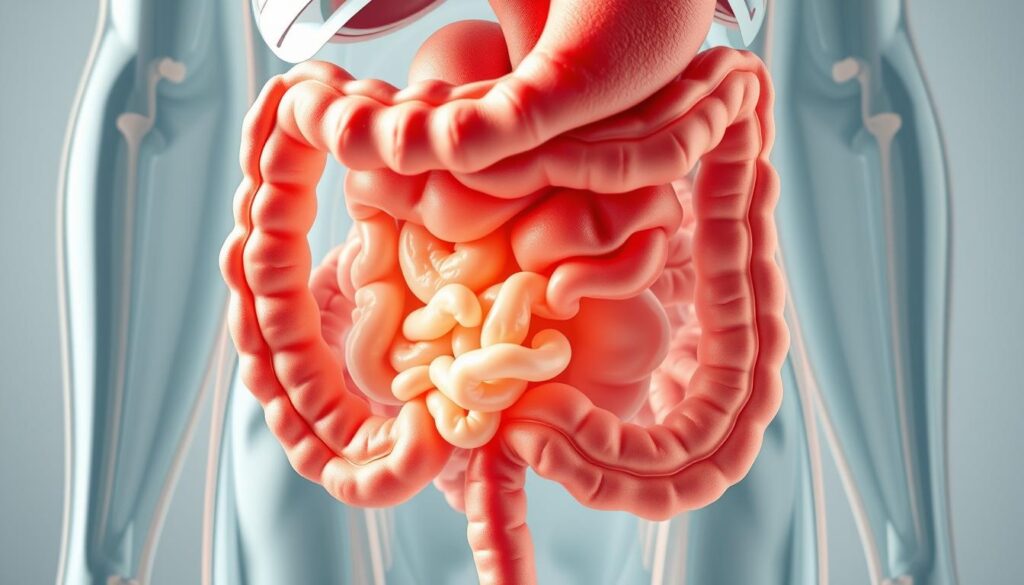How Your Body Changes After Giving Up Sugar
Giving up sugar can be a challenging task, but the benefits to your overall health are substantial. When you start a sugar detox, you’re not just cutting out a sweet treat; you’re adopting a natural detox method that can lead to significant improvements in your well-being.
As you quit sugar, your body undergoes several changes. You may experience initial withdrawal symptoms, but as your body adjusts, you’ll start to notice the health benefits of quitting sugar, such as improved energy levels and clearer skin.
Key Takeaways
- Quitting sugar can lead to improved energy levels.
- A sugar detox can result in clearer skin.
- Giving up sugar is a natural detox method.
- You may experience initial withdrawal symptoms.
- The health benefits of quitting sugar are substantial.
The Hidden Impact of Sugar on Your Health
Consuming sugar is a ubiquitous part of daily life, but its impact on health is often overlooked. Sugar is not just the white granules you add to your coffee or tea; it’s hidden in many foods, from sauces and snacks to seemingly healthy options like yogurt and granola.
Types of Sugar in Your Diet
Types of Sugar in Your Diet
Sugar comes in various forms, including sucrose, fructose, and glucose. These simple carbohydrates are found naturally in foods like fruits and dairy products, but they’re also added to a wide range of processed foods. Understanding the different types of sugar can help you make more informed choices about your diet.
How Much Sugar Americans Typically Consume
Americans consume a significant amount of sugar daily, often exceeding the recommended limits. The average American consumes about 27 pounds of sugar per year, which translates to around 17 teaspoons per day. This excessive sugar intake is linked to various health issues, including obesity, diabetes, and heart disease.
Why Sugar Is Called “Sweet Poison”
Sugar is often referred to as “sweet poison” due to its detrimental health effects when consumed in excess. As Dr. Robert Lustig, a pediatric endocrinologist, notes, “Sugar is a toxin, and it’s a toxin that’s been added to our food supply.” High sugar intake can lead to insulin resistance, inflammation, and other metabolic problems, making it a significant public health concern.
“The more sugar you consume, the more you crave it, creating a vicious cycle that’s hard to break.”
Understanding the impact of sugar on your health is the first step towards making positive changes to your diet and overall well-being.
What Happens to Your Body When You Stop Eating Sugar
Giving up sugar can lead to a multitude of changes in your body, from metabolic resets to hormonal shifts. When you eliminate sugar from your diet, you’re not just reducing your intake of a sweet substance; you’re initiating a series of physiological changes that can significantly impact your health.

The Science Behind Sugar Addiction
Sugar activates the brain’s reward centers, releasing dopamine and creating a feeling of pleasure. This can lead to addiction, as your brain becomes dependent on the constant supply of sugar to feel good. Understanding this mechanism is crucial to overcoming sugar addiction. By quitting sugar, you’re allowing your brain to readjust and find other sources of pleasure and satisfaction.
How Your Metabolism Resets
When you stop eating sugar, your metabolism undergoes a significant reset. Your body is no longer reliant on the quick energy provided by sugar and begins to burn stored fat for fuel. This shift can lead to improved energy levels and weight loss. Moreover, your metabolic rate can increase, helping you to burn calories more efficiently.
The Hormonal Shift
Quitting sugar also triggers a hormonal shift in your body. The reduction in insulin resistance can lead to more balanced blood sugar levels, and the decrease in cortisol (the stress hormone that can be triggered by sugar consumption) can result in reduced fat storage around the abdominal area. This hormonal adjustment can lead to a reduction in cravings for unhealthy foods and an overall improvement in your metabolic health.
By understanding these changes, you can better navigate the process of quitting sugar and embracing a healthier lifestyle. The journey involves not just dietary changes but also a transformation in how your body functions at a fundamental level.
The First 24-48 Hours: Withdrawal Symptoms
The first 24-48 hours without sugar can be tough, but understanding what to expect can help. As you navigate this period, you’ll likely encounter several withdrawal symptoms that can range from mild to severe.
Sugar Withdrawal Headaches
One of the most common symptoms is headaches. These occur because your body is used to the regular intake of sugar, and the sudden absence can cause a drop in blood sugar levels, leading to headaches. Staying hydrated by drinking plenty of water can help alleviate this symptom.
Mood Swings and Irritability
You may also experience mood swings and irritability. The fluctuation in blood sugar levels affects your mood, making you feel more irritable or anxious than usual. Engaging in relaxing activities like meditation or a warm bath can help manage these mood swings.
Fatigue and Brain Fog
Fatigue and brain fog are other symptoms you might encounter. Your body is adjusting to a new energy source, and this transition can leave you feeling lethargic and mentally cloudy. Ensuring you get enough sleep and consuming nutrient-rich foods can help mitigate these effects.
| Symptom | Management Tip |
|---|---|
| Headaches | Stay hydrated with plenty of water |
| Mood Swings | Practice relaxation techniques like meditation |
| Fatigue and Brain Fog | Ensure adequate sleep and eat nutrient-rich foods |
By being prepared for these symptoms and knowing how to manage them, you can make the transition to a sugar-free diet smoother and more manageable.
Days 3-7: Your Taste Buds Begin to Change
As sugar leaves your system, your taste buds begin to recalibrate, enhancing your sensitivity to natural sweetness. This transformation is one of the most significant changes you’ll experience between days 3-7 of your sugar-free journey.
Heightened Sensitivity to Natural Sweetness
You might be surprised at how sweet a piece of fruit tastes after a few days without added sugars. This heightened sensitivity is because your taste buds are no longer dulled by the constant influx of sugar. As a result, you’ll find that natural sources of sweetness, like fruits and vegetables, become more enjoyable.
Reduced Cravings for Processed Foods
As your taste buds change, you’ll notice a decrease in cravings for processed foods, which are often high in added sugars. This reduction occurs because your palate is becoming more discerning, making it easier to choose whole, nutrient-dense foods over processed ones.
According to a study published in the Journal of the Academy of Nutrition and Dietetics, reducing sugar intake can lead to decreased cravings for sweet tastes over time. As you continue on your sugar-free path, you’ll find that your preferences shift towards healthier options.
New Appreciation for Complex Flavors
Without the overpowering taste of sugar, you’ll start to appreciate the complex flavors in foods you might have previously overlooked. This new appreciation can enhance your dining experiences, making meal times more enjoyable and allowing you to explore a wider variety of cuisines.
| Day | Taste Bud Changes | Food Preferences |
|---|---|---|
| 3-5 | Increased sensitivity to sweetness | More inclined towards natural sweetness |
| 5-7 | Adaptation to new flavor profiles | Reduced cravings for processed foods |
As you can see, the period between days 3-7 is crucial for developing a healthier relationship with food. By understanding these changes, you can better support your body during this transition.
Week 2: Energy Levels Stabilize
After two weeks without sugar, your energy levels begin to stabilize, marking a significant improvement in your overall well-being. This stabilization is a result of your body adapting to new ways of producing energy, no longer relying on the quick fixes provided by sugary foods and drinks.

Goodbye Blood Sugar Rollercoaster
One of the most significant changes you’ll notice is the end of the blood sugar rollercoaster. Without the constant influx of sugar, your body no longer experiences the sharp peaks and crashes associated with sugar consumption. This means you’ll have more consistent energy levels throughout the day, reducing the likelihood of energy crashes that can leave you feeling lethargic.
Improved Mental Clarity and Focus
As your body adapts to using alternative sources of energy, you’ll likely notice an improvement in mental clarity and focus. The absence of sugar-induced fog means you can tackle tasks with greater precision and concentration. This clarity can enhance your productivity, making it easier to accomplish daily tasks without feeling mentally drained.
Better Sleep Quality
Quitting sugar also leads to better sleep quality. Without the disruptive effects of sugar on your body’s natural rhythms, you’ll find it easier to fall asleep and stay asleep. Improved sleep quality is closely linked to better energy levels, creating a positive feedback loop that enhances your overall health and well-being.
By the end of the second week, you’ll have made significant progress on your sugar-free journey. The stabilization of energy levels is just the beginning, setting the stage for further improvements in your health and well-being.
Your Digestive System After Quitting Sugar
Quitting sugar can have a profound impact on your digestive health, leading to a more balanced gut microbiome. When you stop consuming sugar, you’re not just reducing your intake of empty calories; you’re also giving your digestive system a chance to heal and function more efficiently.
Changes in Gut Microbiome
One of the most significant changes you may experience after quitting sugar is a shift in your gut microbiome. The bacteria in your gut feed on sugar, and when you remove this food source, the balance of your gut flora can change. This can lead to a more diverse and resilient gut microbiome, which is essential for overall health.
Reduced Bloating and Inflammation
Many people experience reduced bloating and inflammation after quitting sugar. This is because sugar can be difficult for the body to digest, and it can lead to inflammation in the digestive tract. By removing sugar from your diet, you can reduce the strain on your digestive system and alleviate symptoms like bloating.
Improved Nutrient Absorption
When you quit sugar, you may also experience improved nutrient absorption. Sugar can interfere with the body’s ability to absorb essential nutrients, so removing it from your diet can help ensure that you’re getting the most out of the food you eat.
Enhanced Digestive Enzyme Function
A key factor in improved nutrient absorption is the enhanced function of digestive enzymes. When you’re consuming high amounts of sugar, your digestive enzymes can become imbalanced. By quitting sugar, you allow your digestive system to rebalance and optimize its enzyme production, leading to more efficient digestion.
| Digestive Benefits | Before Quitting Sugar | After Quitting Sugar |
|---|---|---|
| Gut Microbiome | Imbalanced due to sugar feeding bad bacteria | More balanced and diverse |
| Bloating and Inflammation | Common due to sugar’s impact on digestion | Reduced as digestive system heals |
| Nutrient Absorption | Impaired by sugar consumption | Improved as digestive enzymes optimize |

How Your Skin Transforms Without Sugar
The decision to stop consuming sugar can have a profound impact on your skin health, leading to a clearer and more youthful appearance. When you quit sugar, you’re not just improving your overall health; you’re also giving your skin a chance to rejuvenate and flourish.

Reduction in Acne and Breakouts
One of the most immediate benefits of a sugar-free diet is the reduction in acne and breakouts. Sugar consumption is linked to increased inflammation in the body, which can manifest on the skin as acne. By eliminating or significantly reducing sugar intake, you can decrease the occurrence of these breakouts, leading to clearer skin.
- Reduced Inflammation: Lower sugar intake means less inflammation, which is a key factor in the development of acne.
- Balanced Hormones: Sugar can disrupt hormonal balances, which in turn can lead to skin issues. A sugar-free diet helps in maintaining hormonal equilibrium.
Improved Collagen Production and Elasticity
Collagen is essential for maintaining skin elasticity and youthful appearance. Consuming high amounts of sugar can lead to glycation, a process where sugar molecules bind to collagen, making it stiff and less effective. By quitting sugar, you can improve your skin’s collagen production and elasticity.
Técnicas de desintoxicação holística, or holistic detox techniques, can further support this process by promoting overall skin health and enhancing the body’s natural ability to produce collagen.
Decreased Glycation and Aging Effects
Glycation is a natural process that occurs over time, but it’s accelerated by high sugar intake. By reducing sugar consumption, you can decrease glycation, thereby reducing the visible signs of aging such as wrinkles and fine lines.
- Less Sugar = Less Glycation
- Improved Skin Elasticity
- More Youthful Appearance
In conclusion, quitting sugar has a multifaceted positive impact on your skin, from reducing acne and improving collagen production to decreasing the aging effects of glycation. By making this change, you’re investing in healthier, more radiant skin.
Weight Changes You Can Expect
When you stop consuming sugar, your body undergoes several changes that can significantly impact your weight. One of the primary effects is on how your body stores fat.
Why Sugar Promotes Fat Storage
Sugar is quickly absorbed into your bloodstream, causing a spike in blood sugar levels. This triggers an insulin surge, which facilitates the storage of glucose as fat, particularly around the abdominal area. As Dr. Mark Hyman notes, “Sugar is a major driver of visceral fat, which is associated with various health risks.”
“The more sugar you consume, the more your body stores fat, making it harder to lose weight.”
Timeline for Noticeable Weight Loss
Noticeable weight loss typically begins within the first two weeks after quitting sugar. During this period, your body starts to adjust to new energy sources, and your metabolism resets. You may experience a reduction in bloating and water retention, contributing to weight loss.
Changes in Body Composition
As you continue without sugar, you’ll notice changes in your body composition. Your body starts to burn stored fat for energy, leading to a reduction in body fat percentage.
Reduced Visceral Fat
Visceral fat, the fat around your organs, is particularly responsive to dietary changes. Quitting sugar can lead to a significant reduction in visceral fat, improving overall health and reducing the risk of chronic diseases.

By understanding how quitting sugar affects your body, you can better appreciate the changes you’re experiencing and stay motivated on your journey to a healthier lifestyle.
Mental Health Benefits of a Sugar-Free Life
Adopting a sugar-free lifestyle can have a profound impact on your mental health. By eliminating or significantly reducing sugar from your diet, you can experience a range of benefits that contribute to overall mental well-being.
Reduced Anxiety and Depression
Consuming high amounts of sugar can lead to fluctuations in blood sugar levels, which may exacerbate symptoms of anxiety and depression. By quitting sugar, you can help stabilize your mood and reduce the risk of these mental health issues. Studies have shown that a diet low in sugar can lead to improved mental health outcomes, including reduced symptoms of anxiety and depression.
Improved Emotional Regulation
A sugar-free diet can also lead to better emotional regulation. When you consume less sugar, your body’s insulin response is more balanced, which can help regulate your mood and emotional responses. This can lead to a more stable and positive emotional state.
Enhanced Cognitive Function
Reducing sugar intake can also enhance cognitive function. A diet low in sugar has been associated with improved concentration, memory, and mental clarity. By giving up sugar, you can experience these cognitive benefits, leading to improved performance in daily activities and tasks.
Cardiovascular Improvements After Quitting Sugar
When you stop consuming sugar, your body undergoes several changes that positively impact your heart health. One of the most significant benefits of quitting sugar is the improvement in your cardiovascular well-being. This change is not just about avoiding heart disease; it’s about enhancing your overall health.
Normalized Blood Pressure
High sugar intake is linked to increased blood pressure, a major risk factor for heart disease. By quitting sugar, you can help normalize your blood pressure. Reducing sodium intake and increasing potassium-rich foods can further support this process.
Improved Cholesterol Profile
Sugar consumption can lead to unfavorable changes in your cholesterol levels, including higher triglycerides and lower HDL (good) cholesterol. Stopping sugar intake can help improve your cholesterol profile, reducing the risk of heart disease.
Reduced Inflammation Markers
Consuming high amounts of sugar can lead to chronic inflammation, which is harmful to your cardiovascular health. Quitting sugar can reduce inflammation markers in your body, contributing to a healthier heart.
Impact on Heart Disease Risk
The combination of normalized blood pressure, improved cholesterol profile, and reduced inflammation markers significantly lowers your risk of heart disease. This reduction in risk is a crucial benefit of adopting a sugar-free diet.
| Cardiovascular Indicator | With High Sugar Intake | After Quitting Sugar |
|---|---|---|
| Blood Pressure | High | Normalized |
| Cholesterol Profile | Unfavorable | Improved |
| Inflammation Markers | Elevated | Reduced |
By making the decision to quit sugar, you’re taking a significant step towards improving your cardiovascular health. The benefits are multifaceted, from reducing your risk of heart disease to enhancing your overall well-being.
Long-Term Health Improvements
A sugar-free lifestyle can lead to remarkable long-term health improvements, enhancing your overall quality of life. As you continue to avoid sugar, you’ll notice significant benefits that contribute to a healthier, more vibrant you.
Reduced Risk of Type 2 Diabetes
One of the most significant long-term benefits of quitting sugar is a reduced risk of developing type 2 diabetes. Consuming high amounts of sugar can lead to insulin resistance, a precursor to diabetes. By eliminating or significantly reducing sugar intake, you’re giving your body a better chance to regulate blood sugar levels effectively.
Better Dental Health
Sugar is a primary source of energy for the bacteria that cause tooth decay and other dental issues. By cutting out sugar, you’re reducing the risk of cavities and gum disease, leading to better overall dental health. This means fewer visits to the dentist and a healthier, brighter smile.
Improved Immune Function
A diet high in sugar can weaken your immune system, making you more susceptible to illnesses. Quitting sugar helps to boost your immune function, enabling your body to fight off infections more effectively. This means you’ll be less likely to get sick and will recover faster when you do.
Potential Cancer Risk Reduction
Some studies suggest that reducing sugar intake may help lower the risk of certain cancers. While more research is needed, cutting out sugar is a healthy choice that can contribute to overall well-being and potentially reduce cancer risk. By focusing on whole, nutrient-dense foods, you’re giving your body the best chance to stay healthy.
In conclusion, the long-term health benefits of quitting sugar are substantial and far-reaching. By making this change, you’re investing in a healthier future, reducing the risk of chronic diseases, and enhancing your overall quality of life.
Conclusion: Embracing a Lower-Sugar Lifestyle
As you’ve seen, reducing or eliminating sugar from your diet can have a significant impact on your overall health. By understanding the effects of sugar on your body and making conscious choices, you can experience the numerous health benefits associated with a lower-sugar lifestyle.
By adopting a lower-sugar lifestyle, you can stabilize your energy levels, improve your mental clarity, and enhance your overall well-being. The positive changes that occur when you reduce sugar intake are not limited to physical health; they also extend to mental health benefits, such as reduced anxiety and depression.
To make sustainable lifestyle changes, start by being more mindful of the foods you consume. Read labels, choose whole foods over processed ones, and explore new recipes that are low in added sugars. As you continue on this path, you’ll not only reduce your sugar intake but also cultivate healthier habits that can lead to long-term health improvements, including a reduced risk of chronic diseases.
By embracing a lower-sugar lifestyle, you’re taking a significant step towards achieving overall health and wellness, and experiencing the benefits of sugar reduction firsthand.


